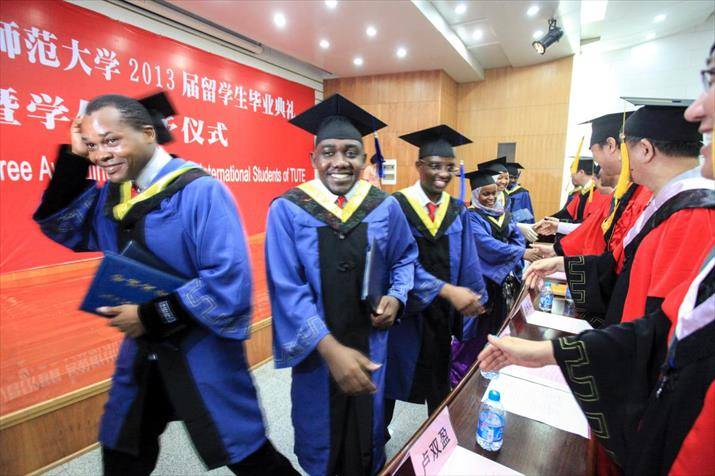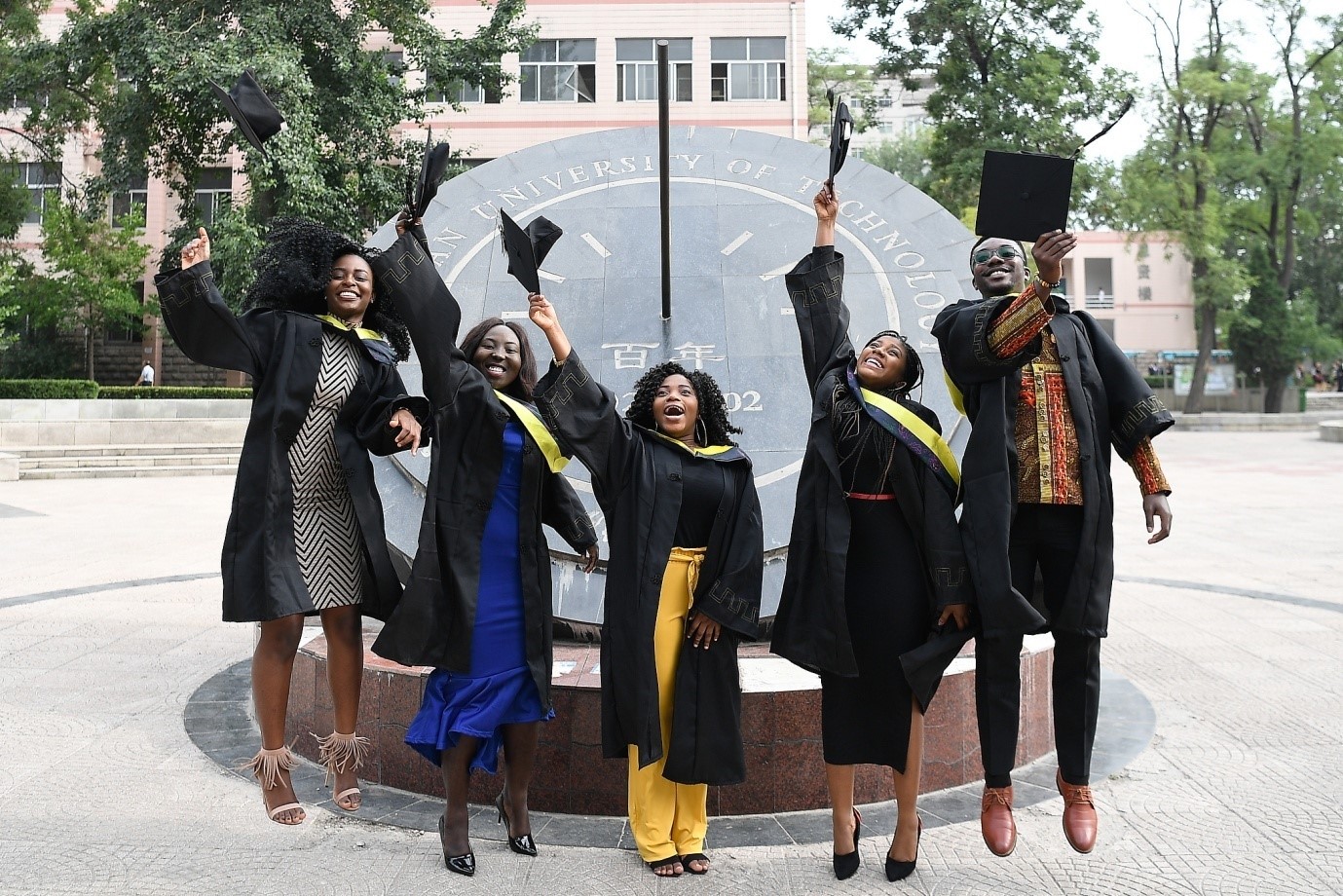Africa-China Relations
Africa-China Relations
The first contact between Africa and China dates back to the mid-8th century during China’s Tang Dynasty (618-907) – about 1, 260 years ago. Du Huan, a Chinese military officer captured by the Arabs in the Battle of Talas in 751, later travelled across several places in West Asia and North Africa. He returned to China in 762 and wrote a book about his journey. Du Huan is the first known Chinese to have arrived in Africa. Similarly, Moroccan explorer Ibn Battuta travelled to China in the 14th century and returned to North Africa with stories of the East.
However, compared to the two individual travellers, Du Huan and Ibn Battuta, Chinese navigator Zheng He in the Ming Dynasty (1368-1644) led trade envoys and reportedly reached the eastern and southern Africa coastal region four times, sowing the initial seeds for China-Africa friendship, and carving out an ancient maritime Silk Road trade route.
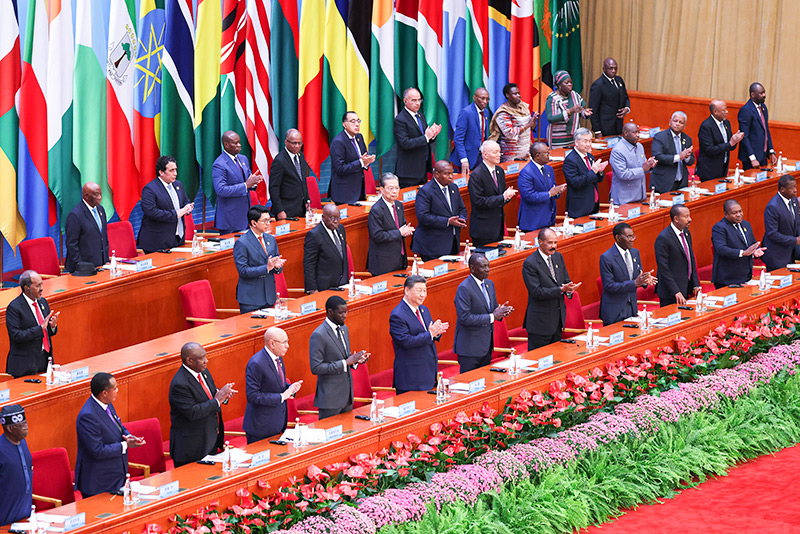
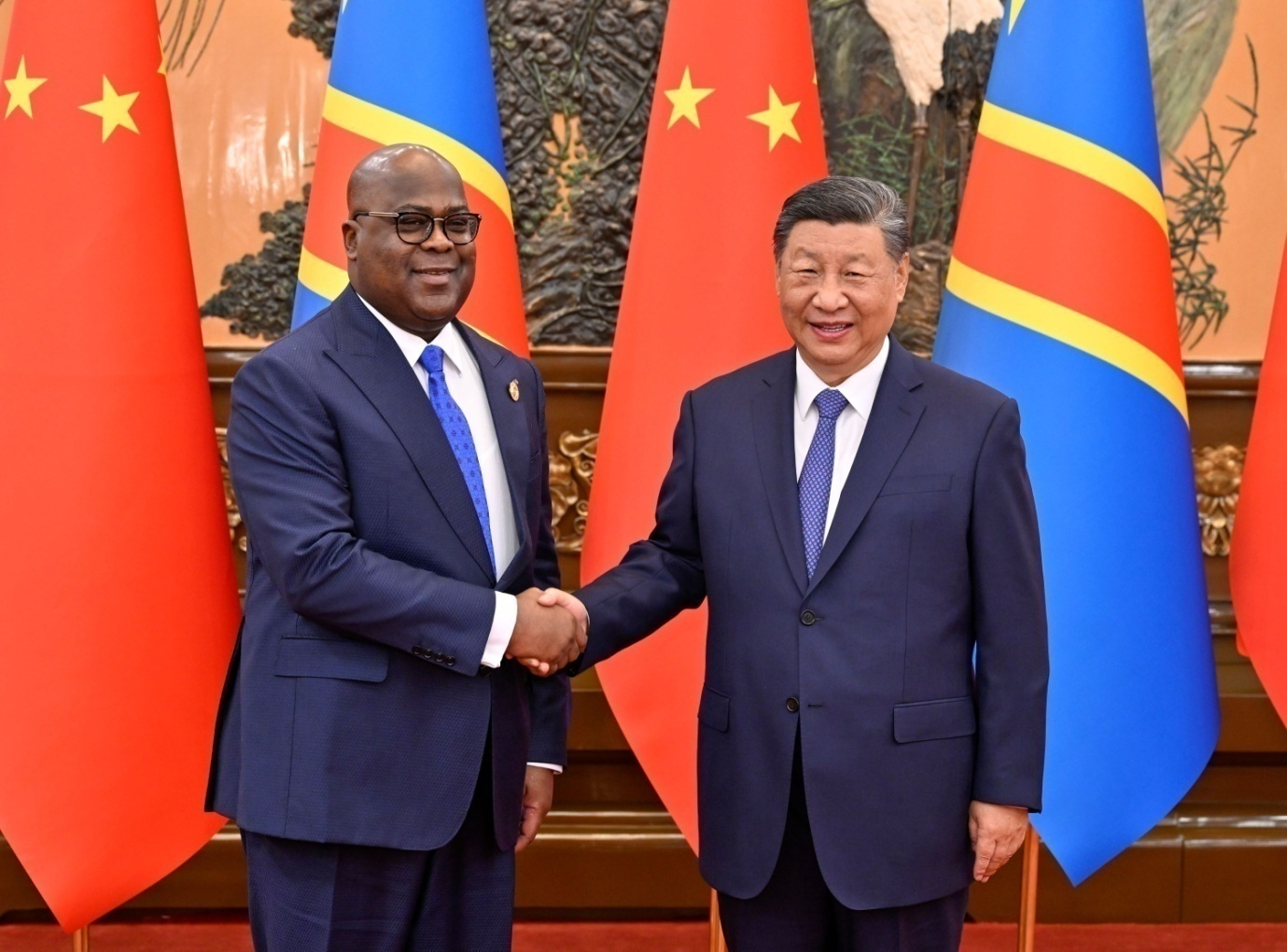
Diplomatic Ties
Following the founding of the People’s Republic of China in 1949, the Chinese government led by Mao Zedong built strong political ties with Africa. Between 1949 and 1979 China established diplomatic ties with a host of African countries, starting with Egypt in 1956. By 1980, China had established diplomatic relations with 45 African countries. The period coincided with a time when African countries fought for their independence against colonial powers. China supported African countries in their cause and helped develop their economies. For example, between 1970 and 1976 China financed and built the Tanzania-Zambia Railway, also known as Tazara Railway. Covering a total length of 1,860.5 kilometres, the Tazara Railway which links Southern Africa’s regional transport network to Eastern Africa's seaport of Dar es Salaam is considered a monument of China-Africa relation.
During this period, support from African countries helped China restore its lawful seat at the United Nations. On October 1971 the 26th session of the UN General Assembly adopted Resolution 2,758 to restore the People’s Republic of China’s lawful seat. Among the 76 yes votes, 26 were African countries. Chairman Mao Zedong said that ‘‘it is our African brothers who have carried us into UN.’’
Benefitting from mutual political support, trade and economic cooperation between Africa and China has gained momentum since the late 1970s and early 1980s as China commenced its reforms and opening up. Additionally, the launch of the Forum on China-Africa Cooperation (FOCAC) in October 2000 further enhanced practical cooperation in various fields between both parties.
AFRICA–CHINA EDUCATION COOPERATION DIARY
2022: Chinese astronauts talk from Space with African youth
Three Chinese astronauts, or taikonauts, talked from space with the youth from eight African countries on September 6, 2022 via video link, sharing their experience in the Shenzhou-14 mission. The main venue of the event, titled "Talk with Taikonauts," was held at the headquarters of the African Union in Addis Ababa, while students from Algeria, Egypt, Ethiopia, Namibia, Nigeria, Senegal, Somalia and South Africa joined the dialogue at sub-venues.
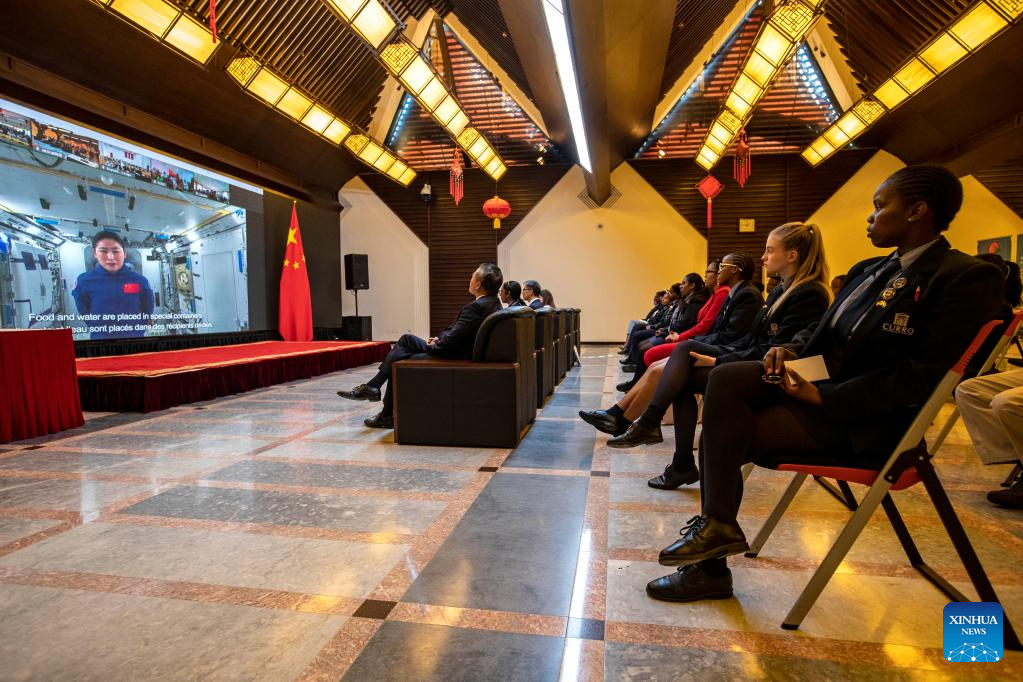
Photo taken on Sept. 6, 2022 shows the view of a sub-venue of the event titled "Talk with Taikonauts" in Pretoria, South Africa.
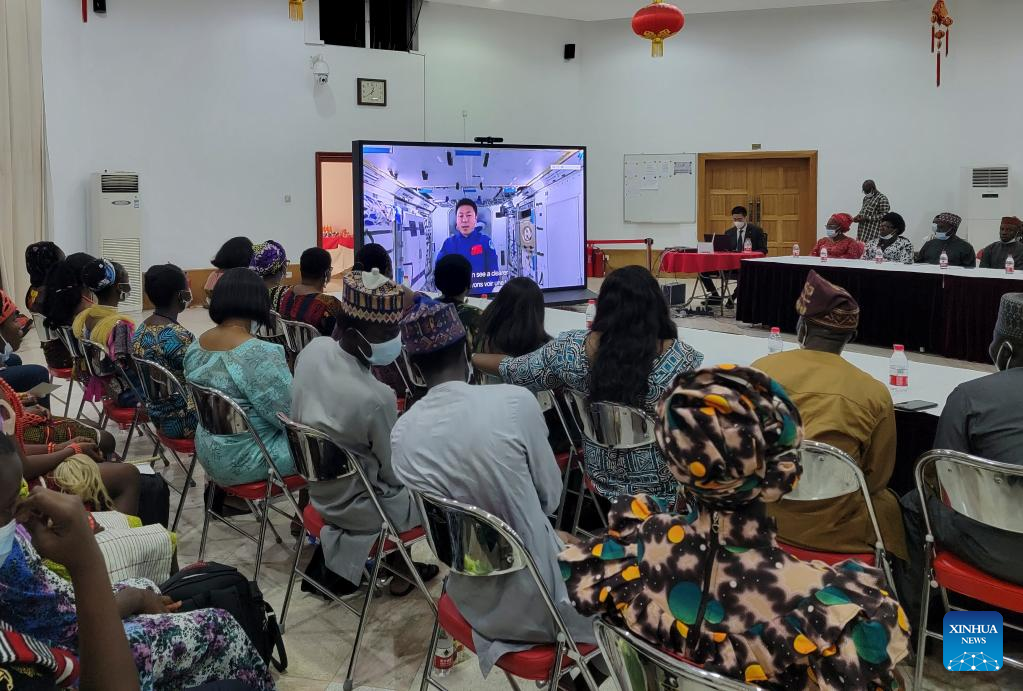
Photo taken on Sept. 6, 2022 shows the view of a sub-venue of the event titled "Talk with Taikonauts" in Abuja, Nigeria.
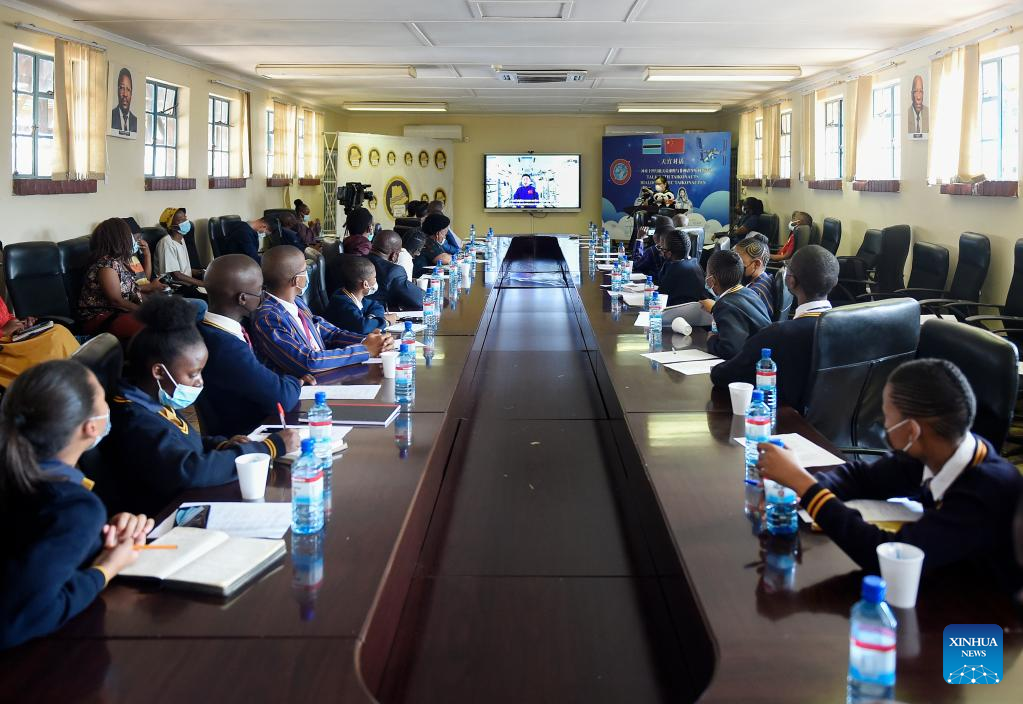
People watch the event titled "Talk with Taikonauts" via video link in Gaborone, Botswana, Sept. 6, 2022.
Find out more about Africa-China Education
Cooperation
‘‘As a basic human right, education, a linchpin of sustainable development, with the tendency to lift millions of people out of extreme poverty and level inequality, has faced decades-long challenges across countries on the African continent. An in-depth analysis shows that, prior to 1960, Africa experienced marginal access to school. However, access to education improved during the 1960s and 1970s when African modern education systems expanded steadily – this was possible because education was highly prioritized.
Unfortunately, the expansion of the modern education system was short-lived – Africa experienced stagnation and decline in the 1980s – this was as a result of a myriad of factors, notable among them is the drastic decrease in education financing. Faced with several daunting challenges including inadequate education financing, low and inequitable access to education, weak education system capacity, outdated curriculum, and weak links to the world of work, policymakers and relevant domestic and international partners have committed resources since 1990 to reverse this trend – notable among the international partners is China.
As a major contributor, China’s dedication to provide sustainable solutions to challenges in Africa’s education sector is phenomenal - between 2000 and 2020 the Asian giant aided the construction of more than 170 schools, trained over 160,000 professionals across various fields and created more than 4.5 million jobs in Africa – the trained professionals and Chinese-built schools, located in both urban and rural areas, have significantly improved the quality of education, contributing in tackling the lack of trained teachers and unequal access to education, which are major challenges in Africa.
At every level of education, cooperation with Beijing and Chinese enterprises has been crucial to efforts dedicated to tackling pressing challenges in Africa. For instance, to close the persistent teacher gap and lack of adequate professionals which for decades has impeded teaching and learning at all levels of education in Africa; cooperation with the Chinese government and enterprises has brought about significant gains. To highlight a few recent achievements, on July 5 a total of 65 Nigerian students were given a grand welcome upon their return to Nigeria after completing a scholarship program in China.
Sponsored by the China Civil Engineering Construction Corporation (CCECC) and facilitated by the Nigerian government and two Chinese universities, the scholarship program has produced highly skilled and educated professionals for Nigeria – among the recent 65 beneficiaries, 16 are postgraduates and 49 are undergraduate students with specializations in various disciplines including transport engineering and civil engineering – as part of their obligations to the country, the returnees are expected to contribute in scaling the capacities of Nigeria’s education sector, especially higher-educational institutions, to produce more highly skilled and educated professionals to foster development.
Similarly, in other African countries, China through scholarship programs provides unflinching support in training adequate professionals for the region’s education sector. In fact, China’s scholarship programs in Africa, aimed at fostering academic exchange and providing the continent with highly skilled and educated professionals in various sectors including the education sector is second to none. According to the United Nations Educational, Scientific and Cultural Organization (UNESCO) Global Education Monitoring report (2020), China is the single largest provider of university scholarships to students from sub-Saharan Africa (SSA), awarding about 12,000 from a total of 30,000 bursaries that were distributed by the top 50 global donors.’’ – Excerpt from the Ghana Centre for China Studies (GCCS) publication titled ‘‘Cooperation with China Tackles Challenges of Education in Africa,’’ jointly published with China Daily and republished by Luban Workshop.
OUR IMPACT
- CHINA
-
-
Tsinghua University report on China-Africa cooperation cites Ghana
Centre for China Studies (GCCS) publication titled ‘‘The Truth about
unemployment in Africa’’
Report: China-Africa development cooperation for the agricultural value chain: Drives and approaches after COVID-19
Download report: See pg.1 for cited GCCS publication - Leading expert at Ghana Centre for China Studies (GCCS) quoted extensively on the official website of the State Council Information Office (SCIO)of the People’s Republic of China
-
Tsinghua University report on China-Africa cooperation cites Ghana
Centre for China Studies (GCCS) publication titled ‘‘The Truth about
unemployment in Africa’’
- NORWAY
-
-
Norway-based Peace Research Institute Oslo (PRIO) policy brief cites
Ghana Centre for China Studies (GCCS) publication titled "China-Ghana
relations: What lies ahead?"
Policy Brief: China’s Engagement in West Africa: The Case of Ghana and Senegal
Download policy brief: See ref. no.10 for cited GCCS publication
-
Norway-based Peace Research Institute Oslo (PRIO) policy brief cites
Ghana Centre for China Studies (GCCS) publication titled "China-Ghana
relations: What lies ahead?"
- MALAYSIA
-
- The Association of Development Finance Institutions of Malaysia (ADFIM) republished GCCS article on China and Horn of Africa cooperation
- The Star, Malaysia’s leading newspaper republished GCCS article on China and Horn of Africa cooperation on food security
- SWEDEN
-
-
A study on Chinese FDI and African health systems conducted at the Lund University
cites Ghana
Centre for China Studies (GCCS) publication titled "Does Chinese investment
strengthen African health systems?"
Thesis: : Chinese FDI and the African health system
Download thesis: See pg.13 for cited GCCS publication
-
A study on Chinese FDI and African health systems conducted at the Lund University
cites Ghana
Centre for China Studies (GCCS) publication titled "Does Chinese investment
strengthen African health systems?"
- AUSTRIA
-
-
Central European University thesis on Western and Chinese development
assistance in Ghana cites Ghana
Centre for China Studies (GCCS) publication titled "China-Ghana relations:
What lies ahead?"
Thesis: What Do You Mean By Development Aid? Identifying Western And Chinese Development Assistance in Ghana
Download thesis: See pg.50 for cited GCCS publication
-
Central European University thesis on Western and Chinese development
assistance in Ghana cites Ghana
Centre for China Studies (GCCS) publication titled "China-Ghana relations:
What lies ahead?"
- AUSTRIA
-
-
A study on Africa-China trade conducted at the University of Johannesburg cites Ghana
Centre for China Studies (GCCS)
publication titled "China-Ghana relations: What lies ahead?"
Thesis: The transformation of Africa-China trade from basic good dependency to high-tech: mutually beneficial or perpetuation of Africa’s disadvantaged economic position
Download thesis: See pg.18 for cited GCCS publication
-
A study on Africa-China trade conducted at the University of Johannesburg cites Ghana
Centre for China Studies (GCCS)
publication titled "China-Ghana relations: What lies ahead?"
- PORTUGAL
-
- The Palgrave Handbook on China-Europe-Africa relations co-authored by professors at University of Macau, Universidade da Beira Interior- UBI, Zhejiang Normal University and Universidade de Aveiro cites Ghana Centre for China Studies (GCCS) publication titled ‘‘What’s behind China’s positive image in Africa?’’
OUR PUBLICATIONS
- China-Africa economic and trade expo: Building bridges for development.
- Does Chinese investment strengthen African health systems?
- China-Ghana relations: What lies ahead?
- Agricultural development in China: Are there lessons for Africa?
- Does Chinese investment support Africa’s SMEs?
- Does China create jobs in Africa?
- The Ripple Effect of the Digital Economy on African Film and Music Industries: The Mediating Role of China.
- Africa’s accelerating venture capital financing for tech startups: What is Huawei’s role?
- Does Chinese-built transport infrastructure stimulate growth in Africa?
- What’s behind China’s positive image in Africa?
- China shows the way to improve food security in Horn of Africa
- China-Côte d'Ivoire cooperation: What does the future hold?
- China's poverty alleviation success holds lessons for Nigeria.
- Cooperation with China tackles challenges of education in Africa.
- What’s driving music streaming in Africa?
- Converting waste into resources: Why should Africa tap into China's expertise?
- China-Africa security cooperation: Promoting peace and development.
- Benin's Talon visits China with eye to elevate bilateral ties.
- China-Zambia cooperation: All-weather friends.
- Chinese Investment in African Football: Sowing the Seeds of Success.
- China’s Global Development Initiative: A Viable Alternative for Ghana.
- Internet Access and Rural Development: What Can Ghana learn from China?
- China's push to transform African economies via digitalization aiding sustainable development.
- Mission Harmony-2024: Another Avenue for China-Africa Medical Cooperation.
- Chinese FM's Africa visit: A new paradigm for South-South cooperation
